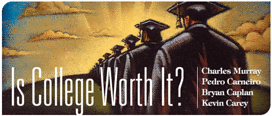Let me suggest something that perhaps we can all agree on, convictions about IQ aside. We need a higher education system that produces much more accurate information about the students it enrolls and educates.
The standard degree consists of only two useful pieces of information printed on a single sheet of paper: the type of degree and the institution attended. Given the vast differences between degrees of similar types and between the qualities of students who graduate from similar institutions, this isn’t a lot for employers or anyone else to go on. So they fall back on what they can infer. For the small minority of students who attend selective institutions, it’s the up-front sorting process. For everyone else, it’s the generalized diligence and intelligence required to amass 60 or 120 credits. The vagueness of these signals makes it hard to pin down the nuances of the interaction between people, colleges, and life outcomes, and thus contributes to the lack of hard data that confuses discussions like the one we’re having here. College transcripts have limited value, because the evaluation process that determines grades is completely non-standardized and unreliable, as is the process for defining and naming courses themselves.
What if, by contrast, college students were able to produce detailed, reliable information about (a) the content of their courses and (b) what they had actually learned? That would pave the way for more sensible variance in degree length. Right now, with degrees based not on learning but on the spent time having been taught, a four-year degree is presumed to be twice as good as a two-year degree—regardless of what it is in or where it is from. If students could prove what they had learned over three years, for example, they’d be able to take that information into the job market with much more confidence. Indeed, attaching real information to course credits might even obviate the need for “degrees” in the traditional sense of the word. Courses, probably earned from a variety of providers, would become the new coin of the realm.
This would also create a market for the kind of third-party certifiers that I think Charles is envisioning, which might be based on vocational tests, but must also be based on many other criteria. This kind of system would likely lead to more specialization among institutions in those academic areas where they have a competitive advantage—something I assume the economists here would support. And this isn’t a fantasy; countries in Europe and elsewhere have been engaged in efforts over the last decade featuring many of these aims via the Bologna process and its “degree framework,” “diploma supplement” and “tuning” processes. (They’re keeping a standard degree framework: 3 years for a bachelor’s, 5 for a master’s.)
As long as we maintain public policies focused on maintaining access and quality—as long as all students have a fair chance to access high-quality college teaching at a reasonably low price, regardless of their socioeconomic background—I’d certainly be willing to open up the higher education system to experimentation and innovation on the degree and credit information side of things and see what happens.
Perhaps many students would opt out of the traditional four-year track, perhaps not. The important thing is that we wouldn’t decide for them ahead of time by narrowing their educational options prematurely.

